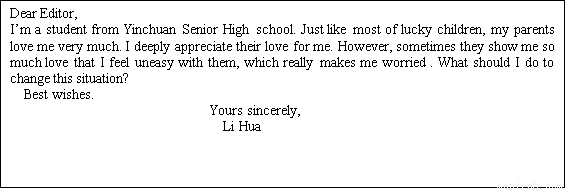题目内容
完形填空
阅读下面短文,从短文后各题所给的四个选项(A、B、C和D)中,选出可以填入空白处的最佳选项,并在答题卡上将该项涂黑。
I was never very neat, while my roommate Kate was extremely ________ . Each of her objects had its place, but mine ________ hid somewhere. She even labeled everything. I always ________ everything. Over time, Kate got neater and I got ________ . She would push my dirty clothing over, and I would ________ my books on her tidy desk. We both got tired of each other.
War broke out one evening. Kate came into the room. Soon, I heard her ________, “Take your shoes away! ________ under my bed! ” Deafened, I saw my shoes flying at me. I jumped ________ my feet and started yelling. She yelled back louder.
The room was ________ with anger. We could not have stayed together for a single minute but for a phone call. Kate ________ it. From her end of the conversation, I could ________ right away her grandma was ________ . When she hung up, she quickly crawled under her ________ , sobbing. Obviously, that was something she should not ________alone. All of a sudden, a warm feeling of ________ rose up in my heart.
Slowly, I collected the pencils, took back the books, made my bed, cleaned the socks and swept the ________ , even on her side. I got ________ into my work that I even didn't ________ Kate had sat up. She was watching, her tears dried. Then, she reached out her hands to grasp mine. I looked up into her ________ . She smiled at me, “Thanks.”
Kate and I stayed roommates for the rest of the ________ . We didn't always agree, but we learned the key to living together: giving in, cleaning up and holding on.
1.A. organizedB. plannedC. arrangedD. determined
2.A. seldomB. hardlyC. alwaysD. never
3. A. look intoB. looked forC. look atD. look through
4.A. messierB. happierC. cleanerD. easier
5.A. lieB. hideC. throwD. lay
6. A. talkingB. screamingC. laughingD. quarrelling
7. A. WhatB. WhenC. HowD. Why
8.A. toB. offC. atD. on
9.A. fullB. connectedC. filledD. crowded
10.A. heardB. answeredC. receivedD. replied
11.A. sayB. seeC. speakD. tell
12. A. happyB. dangerousC. illD. upset
13.A. coversB. sheetC. clothesD. bed
14. A. go forB. pick upC. go intoD. go through
15.A. prideB. sympathyC. supportD. help
16.A. courtyardB. outsideC. floorD. ceiling
17.A. soB. veryC. manyD. much
18.A. understandB. watchC. thinkD. notice
19.A. faceB. heartC. eyesD. mind
20.A. dayB. yearC. weekD. life


